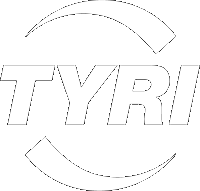Better colour rendering offers many benefits
Caravan Mill provides its customers with gravel and sand which they refine from blasted stone. A job that requires precision and powerful machines. The work environment is dusty and often dark so the lighting on their machines is crucial for both the employee’s health and safety as well as the productivity at work.
To meet the challenges of reflections, colour rendering and a safe work environment for the operators, TYRI has spent four years developing a LED work light that now measures 90-95 CRI (colour rendering index). As the lighting approaches temperature of natural daylight, 100 CRI, it is much easier to see variations in the environment, the quality of the material, clearer contrasts and colours become more accurate.
When TYRI wanted to test the new Hi-CRI work lights in a real-world environment a dialogue was opened with Caravan Mill, a company that really has the conditions to test the work lights in a tough environment. The result was both better working conditions and increased productivity.
“For us, good lighting is primarily a work environment and safety issue. We work long days and for large parts of the year it is dark both in the morning and in the afternoons. Drivers have a hard time dealing with the big differences between white bright light from the headlights and the dark environment next to the machine. When the eye is forced to switch between white light and darkness for many hours, the consequence is often headache and fatigue. With TYRI´s new work lights, it has become much better. Today, we have significantly better lighting on our test machines that makes our drivers feel better and with that safety and productivity increases.” says Pierre Jakobsson at Caravan Mill.
Following discussions with TYRI customers it became clear that dazzling bright light caused operators to suffer issues within tasks such as snow removal, as well as causing difficulties in deciphering different stone materials and fractions. TYRI started work developing work lights that have a better colour rendering and warmer colour temperature to help solve some of these issues. This was a challenge as LED work lights have historically not been able to solve this dilemma. However, TYRI focused on finding a solution through in its own research and development department, and proved it was indeed possible.

“Good lighting is not always, or very rarely, about how much light you get out of a work light, what you measure in the lumen value. The important thing is to create lighting in the work area that is even and as close to the daylight quality as possible. Then you achieve the best visual environment possible, the surroundings are reflected in the most effective way and the eye does not have to work as hard. This applies to all environments, regardless of whether you work with snow removal, in the forest, in the field or in mines and quarries.” says Claes Laitinen, Product Developer at TYRI.
The new HI-CRI work lights developed by TYRI achieve the day light quality that best reflects the natural colours. Previously, LED work lights from premium manufacturers were between 70-75 CRI and users have become accustomed to that level. When you went from halogen lamps, which were often close to 100 CRI, to LED several years ago, colour rendering was one of the major disadvantages. However, this was almost forgotten because there are so many other benefits of LED.
“TYRI always want to create better lighting for work machines, that is our mission and our promise to the market. Therefore, we have always tried to develop LED lighting that can reach its optimal potential. For several years, we have worked to increase colour rendering because we know that safety and the working environment will be better as the light approaches daylight in quality.
The technology has not been with us historically and we have had challenges in creating strong enough light with the new technology, but now we see that it is possible to find solutions and then we want to be the first to test how well our work lights perform in a real environment. The collaboration we have had with Caravan Mill has been important in this work.
Together, we have learned a lot about how the new type of work lights should be applied to create the best possible conditions and it looks very promising that mass production of this type of work light can be rolled out soon.” says Claes Laitinen.



